pitopito korero
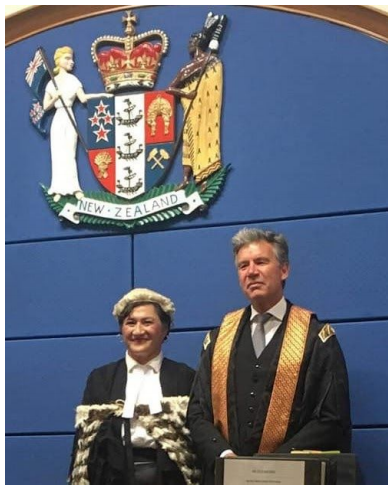
Katie Paul – The Richest Backstory March 9, 2020
From the tiny village wedged between lakes Rotorua and Rotoiti – Mourea, Katie Paul, Te Arawa and Mataatatua, completed a law degree in 1998, became a New Zealand diplomat and a governor on multimillion land trusts and incorporations. She is now bringing her legal skills closer to home, adding to Rotorua’s close-knit population of barristers and solicitors.
Katie Paul’s 20-year detour into New Zealand’s legal profession was indeed rich, having been eligible since completing a double degree in law and fine arts in 1998 at Victoria University. An affluence of diplomatic overseas experience might go some way to inform Justice Muir’s observation; from managing nuclear-based relationships with global superpowers to local trusts, administering treaty settlements and teaching environmental responsibility. She chose the path much less conventional towards law.
It was foreign affairs that drew her to study an LLB at Victoria. A recognised public speaker/debater in high-school, Ms Paul was one of 32 hand-picked youth ambassadors to attend Brisbane’s World Expo in 1988 who got the chance to talk to important visitors. Enthralled by the role of New Zealand’s Trade Ambassador to Australia, she asked him what was required to get into diplomacy. The answer was a double degree, including law and an aptitude for languages. She was already fluent in te reo.
Intrepid journeys
Ms Paul’s excursion into foreign affairs led her on an adventure through varied international focus lenses. She advised on major material exports for India’s Bollywood industry, became the second secretary ranked responsible for matters economic in South Korea, and played a hand in re-kindling favour with the United States Pacific Command in Hawaii. It was the first stitch in both countries’ relationship since Lange banned nuclear ships from New Zealand waters.
Being a career diplomat meant negotiating to protect and nurture New Zealand’s interests.
“Every meeting is a negotiation, and mediation and arbitration are heavy factors. Arbitration through international courts was commonplace, it’s less expensive to train for that when you have a legal background.”
Her legal education was never arrested, she recounts.
“There’s this misconception that diplomacy is all about spies and cocktail functions. That only happens occasionally.”
Speaking of her time in Korea, Ms Paul recounted partaking in mediations under the International Whaling Commission (IWC) and how the Asian nation was New Zealand’s third largest export market for timber.
“We were helping the Koreans to develop building standards suitable for the use of New Zealand timber. They were very interested. I sent a Korean professor to live in Rotorua to rewrite their building standards!” Years later, I find myself still promoting Rotorua’s forest exports, she laughed.
On that post, it took Ms Paul just 8 months to learn Korean to a relative fluency.
She returned to New Zealand in 2005, raising her two sons, Te Awanui and Aorere, and worked in post treaty settlements with Central North Island (CNI) Iwi Collective and Ngati Whakaue Assets Trust, of which she was Chair.
Following a return to be the senior political and security advisor for the United States relationship in 2011, she was asked to apply for the leading role in Te Arawa River Trust – an organisation closely linked to her own iwi. Traditionally the role was reserved for the men of the tribe. In 2013, she found herself at the helm.
Today, the trust supports three Te Arawa iwi’s kaitiakitanga for the Waikato river. Annual ministerial accords show how crucial the river is as a national and tribal asset. Cultural iwi-led restoration and education projects are the trust’s key focus, caring for the river and its broader environment, including some 22,000km of tributaries which fork off the main water-source.
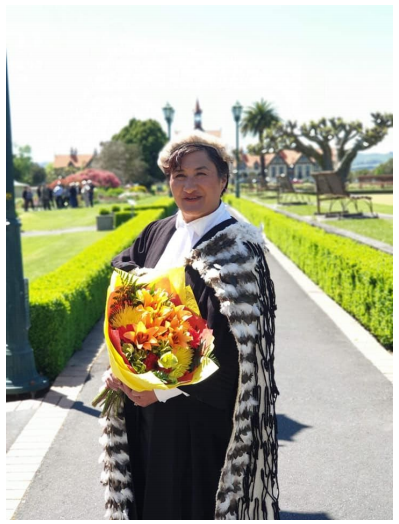
Bringing legal skills home
Vast amounts of trust and settlement work led Ms Paul to refresh her legal education. In 2017 she once again visited Victoria University to brush up her legal repertoire, also necessary for prospective lawyers who hold dated LLB’s.
“I was fascinated with ethics, it wasn’t a subject when I was studying,” says Ms Paul, who’s initial LLB specially focussed on international and environmental law.
She’s now ready to tackle the key obstacles facing the justice system in her hometown.
“The Rotorua Courts are stretched. Around 8,000 cases were processed last year, and of 150 lawyers in the area, just 15 barristers and only one Queen’s Counsel. There needs to be more lawyers in the area available to take this work.”
“Whilst iwi governance is gearing up to grow the wealth of the tribe, the most vulnerable members of those same communities are turning up in the Courts and are over-represented in our prison populations. We need to fix both ends of the communities.”
Utilising her legal experience bore one question Ms Paul asked herself; “How can I be useful to the Rotorua community?”
“As a Chair of a trust I have enough experience as a legal client to know the emphasis on fees and the billable hour does not aid the prohibitive nature of the civil Courts, and issues of accessibility at the bar.”
The case-lawyer imbalance doesn’t help the justice system at the grass-roots level. Critical areas of attention are in the Criminal, civil and trust, family, Māori land and ACC advocacy legal areas, Ms Paul says.
“I want to help my community by working hands-on in these areas at the Bar.”
An advocate for the regions
During her professional legal studies, Ms Paul noticed a theme that threatens to exacerbate the regional gap between high caseloads in the court and low lawyer numbers.
“One of our course tutors had run a practice in Hawera. She asked who was thinking about going to practise in the regions. I was the only one who put my hand up. There’s an undeniable attraction about cities, but there is so much work here in the regions.”
Younger prospective lawyers entering the profession are more likely to stay in New Zealand cities. Ms Paul knows all too well the glamorous picture painted by popular culture.
“There’s always going to be attractive influences. In my time it was US television series like L.A Law and Boston Legal. Now it’s shows like Suits, and you see the city make its mark with an equivalent silk rate. There isn’t enough appealing role modelling in regional New Zealand.”
She raises the juxtaposition of opportunities New Zealand cities offer for legal practitioners, which means the regions consistently face access to justice to issues.
“I’m lucky to be entering the profession at this stage of my life. I’m experienced and settled, money isn’t the key driver.”
Although the course of the justice system’s cover of New Zealand geography is gradually adjusting to recognise its deficits, she adds.
“One of the 21 District Court judges just announced was Rachel Paul, my first cousin, who was also moving counsel for my swearing in.”
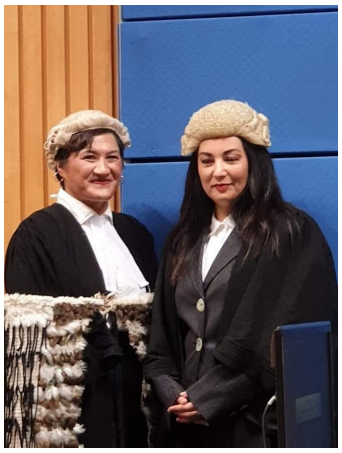
Formerly practising in Ohope, Rachel Paul will be sworn in on 17 February, she joins her brother and Katie’s cousin, Judge Eddie Paul at the District Court bench.
In the right company
Relatively few lawyers acknowledge the opportunity to return to study, but possibly less grasp that opportunity with the inveteracy Katie did, despite her age. She is now 50.
“Like most University students, we were young and fearless in the 1990s,” she says, reflecting on inspirational figures during her initial study at Victoria.
“We looked up to outspoken academics like Moana Jackson, not realising just how radical his propositions for a separate Maori justice system were at the time.”
“Despite our small numbers, we were firm in our beliefs about the status and role of the Treaty of Waitangi and the bi-cultural future of New Zealand.
“It is with great pride that we can now look back and reflect on the role of Moana and now Chief District Court Judge Heemi Taumaunu had in establishing the rangatahi courts as an alternative way of closing the gap between Māori and the justice system.”
“The other great sea of change is that every student at law school is now taught about the Treaty and concepts of tikanga. Whether students are Māori, Pākehā or Chinese, it doesn’t matter. This is another indication of how our legal system will likely grow to become unique to this land.”
It was Ms Paul’s heedless passion for tikanga which sewed the seeds of bi-cultural understanding into New Zealand law school’s curriculums, finding akin in a young Heemi Taumauni. Together they formalised the Māori Law Students Association of Victoria University from their study group.
Ms Paul is already on the pulse of the legal community’s voices. When answering my questions on challenges facing the profession, she emphasised the value of those voices who have already spoken to them.
When asked what’s missing in New Zealand’s legal community, she answers “despite making up half of the profession practicing in New Zealand, the number of lead female counsel in our highest courts is very low.
“In 2018, Jenny Cooper QC said, “active measures are needed to overcome entrenched attitudes that deprive women of opportunities to prove themselves as advocates.”
“There is an attitude that motherhood is a barrier to undertaking leadership roles. As a diplomat who had her second child whilst working overseas, and as the Prime Minister is currently demonstrating, I firmly believe motherhood is a primary motivator for why women can and should work and lead.”
When asked about the importance for the people-focussed approach to land-management, its ties with law generally, she quotes the recently knighted Supreme Court Justice Joe Williams.
“He says “tikanga is seeping into the sinews of New Zealand common law, especially in resource management, property, child welfare and sentencing.” I expect New Zealand’s legal system will continue to be shaped by these cultural values unique to this land.”
By now, the question of which area of practise she will enter is a cliché for Ms Paul, who is probing the journeys of other practitioners.
“It’s things like this magazine which can help push people’s motivation to take up causes in law, like moving to the regions. I saw the LawTalk profile on Jonathan Temm QC and realised he was in Rotorua. So, I gave him a call to learn more about his story.”
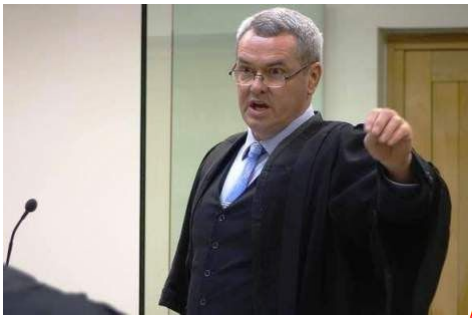
Rotorua’s newly appointed silk, Jonathan Temm will be called to the Inner Bar on 03 April 2020
Continuing the Te Arawa legacy
But before she seeks to oil the rusty cogs of Rotorua’s justice system, Ms Paul is steering one more project, a family tale of local lore with broad global impact.
She’s finishing off a book on her koro, Private Winiata Rewi Tapihana. The Maketu man wrote in a letter home from Europe in 1915 “Te Arawa took those Trenches,” a well-published phrase, still famous within Te Arawa circles now. Private Winiata returned home from war, he became a Māori All Black in 1921. He was a father of 21 children.
Ms Paul is now preserving his extraordinary story for her family and New Zealand in a book.
“It has brought our family together. The living links with koro are my uncles, aunts and mum. I loved listening to their stories about him. I’ll pass these taonga on to my sons,” she told the New Zealand Herald in 2018.
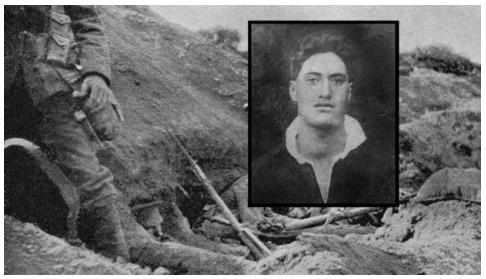
Trenches at Gallipoli and, inset, Katie’s grandfather, Winiata Rewi Tapihana. Photos / Weekly News / Tapsell Family Collection
Winiata the Warrior is part of a broader work commemorating Winiata’s legacy. The New Zealand War Memorial Museum Trust revealed they had bought the mayoral residence of the historic northern French town of Le Quesnoy in November 2018 – 100 years since New Zealand soldiers liberated the town in World War One.
It is the first museum in Europe commemorating New Zealand’s involvement in both world wars. It’s fitting being in a town where New Zealand soldiers had such an influence all those years ago, thanks to Private Winiata.
Ms Paul mentioned the incredibly strong Te Arawa ties to the French village of 5,000. “At the sale of the mayoral residence, my uncles were stood up in front of the town, the mayor explaining who my koro was and what he did back in 1918. And the result from all that history today is a very New Zealand feel about Le Quesnoy.”
Private Winiata was never formally recognised for his heroics, although they are now well known. While sneaking about one night to find food to take back to his comrades, he discovered a way over the ancient walls into the occupied town and brought that knowledge back with his food. Another soldier was medalled for being the first over the wall.
Ms Paul’s work with a historian will mean the book, when published, can be part of New Zealand’s war history canon. A gift to keep future generations learning about New Zealand’s past.
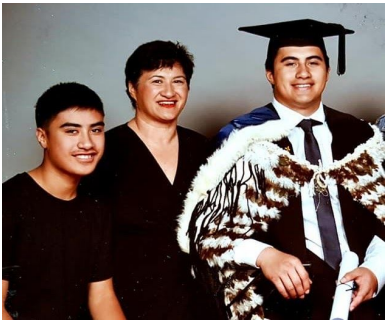
Katie’s son’s- Aorere and Te Awanui Waaka BSc [Anatomy] at Awa’s 2019 graduation ceremony, Otago University.
Ms Paul’s sons are now 22 and 16. Part of their upbringing in South Korea helped them fall in love with online gaming. The eldest is onto his second degree at the University of Otago’s School of pharmacy. The youngest intends to follow the same footsteps.
“I suspect that their generation will have to work through several careers, all of which will be heavily influenced by the development of AI and new technologies. I expect they will work and travel overseas just like their tupuna. My hope is they will bring that experience back to help their communities” she says.
While starting up a legal practice, Ms Paul will maintain a busy international schedule. On the cards is visiting India and China for education, tourism and trade purposes. An invitation to Iceland for the World Geothermal Conference is also contingent on the business of her pursuit of justice at home in Rotorua.
